2013
63rd Berlin International Film Festival
February 7 – 17, 2013
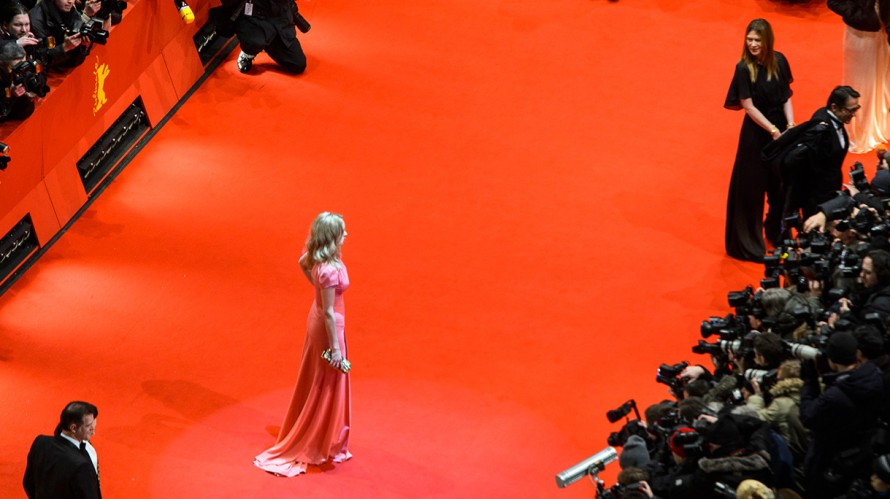
Highlights of the Berlinale 2013
"When a moving story is told in high formal and aesthetic quality, 17,000 Euros and untrained actors can beat million-dollar Arthouse products at a large film festival. That's the message of this year's Berlinale Jury to filmmakers from eastern European regions - often ignored in Cannes and Venice - whose people must contend with the social upheaval of post-communism." – Andreas Borcholte on Epizoda u životu berača željeza, Spiegel Online, February 17, 2013
In 2013, the Berlinale broke the magic mark of 300,000 tickets sold. Audience interest reached a new high point, and within the overflowing variety of films, sections and series, a new trend became noticeable. Though not exclusively, fresh ideas came increasingly from regions that have long lain idle due to political circumstances: eastern Europe and central Asia. Decades after the collapse of communism, countries in these regions are blooming anew, searching for orientation in the trial of history.
This was reflected not least at the award ceremony in the Berlinale Palast, when for the first time in the festival's history, a Romanian film received the Golden Bear: Poziţia Copilului (Child's Pose) by Călin Peter Netzer. The director, who grew up in Germany, tells the story of an overbearing mother's desperate attempts to sweep her son's guilt - he ran over a child - under the rug by way of persuasion and palm-greasing. Netzer uses documentary-style techniques to shape his film, revealing a money-obsessed and corrupt system. Where ideologies have fallen, the omnipotent value of money and the outgrowths of capitalism unleashed become even more visible. The film's producer Ada Solomon was grateful for the open and experimentally-minded nature of the Berlinale Competition that ventured so much in 2013: "Thank you to the Berlinale for being a laboratory!" she exclaimed at the award ceremony.
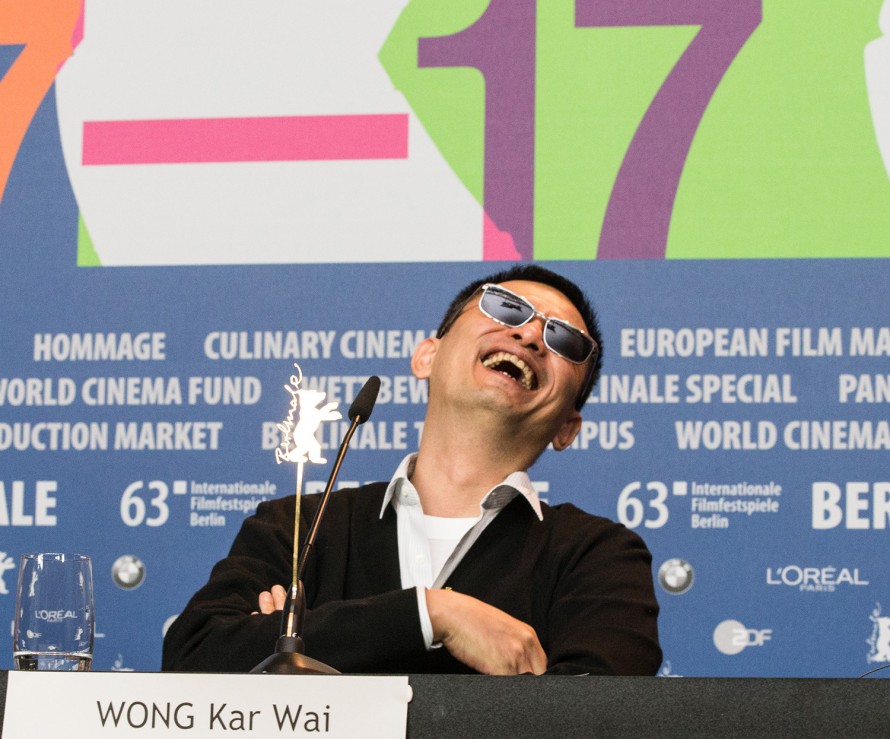
Lots to smile about: International Jury president and opening film director Wong Kar Wai
The second big winner of the evening, Academy Award winner Danis Tanović, stayed close to reality with his film Epizoda u životu berača željeza (An Episode in the Life of an Iron Picker), telling the story of a Roma family's undaunted attempts to survive daily life in Bosnia and Herzegovina. Epizoda u životu berača željeza garnered its director the Jury Grand Prix and its leading man the Silver Bear for Best Actor. The International Jury 2013 was led by Chinese filmmaking icon Wong Kar Wai - whose film Yi dai zong shi (The Grandmaster) opened the Competition - and powerfully staffed by Tim Robbins, Susanne Bier, Andreas Dresen, Shirin Neshat, Athina Tangari and Ellen Kuras. They awarded the Silver Bear for Best Actress to Chilean Actress Paulina Garcia, and the Alfred Bauer Prize (Silver Bear) to Denis Coté with Vic+Flo ont vu un ours (Vic+Flo Saw A Bear), which lingered in audience's memories especially for its ending. David Gordon Green took home the Silver Bear for Best Director for his film Prince Avalanche.
A Bittersweet Victory
Audiences and critics alike were unequivocally enthused about Pardé, the film that received the Silver Bear for Best Screenplay, written by Jafar Panahi. This Silver Bear was another bittersweet moment in the history between the Iranian filmmaker and the Berlinale. Panahi couldn't accept his place on the International Jury in 2011 due to a travel restriction imposed upon him, and likewise wasn't allowed to leave Iran in 2013. His co-director Kamboziya Partovi accepted the award on his behalf. Pardé is an emphatic exploration of the power of imagination in a contained space, and shows that limitations imposed upon a filmmaker from outside can lead to great brilliance. Filmmaking remains an incalculable risk for Panahi: "According to Iranian newspapers, the Ministry of Culture has declared the production of the film Pardé illegal and categorised its premier at the Berlinale a crime" (Zeit Online, February 19, 2013). Another Silver Bear - for Outstanding Artistic Contribution - went to Aziz Zhambakiyev for his camera work in Uroki Garmonii (Harmony Lessons), a WCF-funded film. Its director Emir Baragzin experienced a definitive career push at the 2008 Berlinale Talent Campus and his film Uroki Garmonii was the first Kazakh feature film ever to be presented in the Berlinale Competition. Christiane Peitz of the Tagesspiegel wrote on February 18, 2013: "This year's Competition thoroughly impresses: with stories from wild capitalism in eastern Europe."
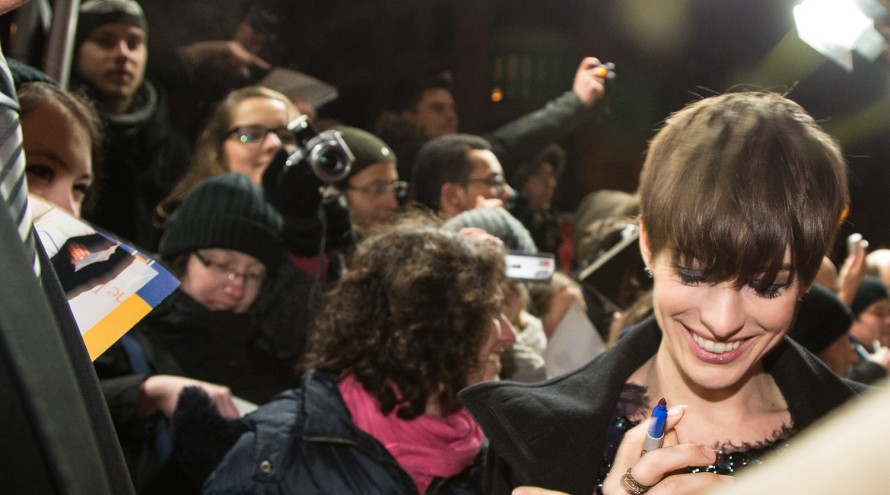
Actress Anne Hathaway at the gala screening of Les Misérables at Friedrichstadt-Palast
However, glamour - so strongly associated with Hollywood that it seems as though it were invented there - naturally couldn't be missed at the 2013 Berlinale: among the stars on the Red Carpet were Jane Fonda, Jude Law, Rooney Mara, Matt Damon, Joseph Gordon-Levitt, Shia LaBeouf, Hugh Jackman, Amanda Seyfried, Holly Hunter, Juliette Binoche and Catherine Deneuve. Day for day, the stars made their way into the Berlinale Palast and just like their fans, did not let the infamous Berlin weather intimidate them. Snow fell right on time for the first gala screening of the festival.
A highlight of the 2013 Competition was Before Midnight. Richard Linklater and his co-authors and lead actors Ethan Hawke and Julie Delpy visited the festival a third time, after 1995 (Before Sunrise) and 2004 (Before Sunset), now with a new episode in the eventful love story of characters Jesse and Céline. It pays to be a regular: Dieter Kosslick presented the surprised and happy director with a Berlinale Camera at the premiere of the film. Another long-time friend of the Berlinale, Rosa von Praunheim, was also awarded a Berlinale Camera on the occasion of the début of the homage film Rosakinder by Tom Tykwer, Julia von Heinz, Chris Kraus, Axel Ranisch and Robert Thalheim.
Strong Showing by US Filmmakers
The lack of American independent films in past Berlinale years was compensated in 2013. Panorama director Wieland Speck presented six feature films and seven documentary films from the US as the heart of his section. Speck saw a new sense of daring in the productions from across the pond, which seem to have shaken off the conservative spirit of the Bush era. But this libertine atmosphere was apparent across the whole of the Panorama programme and noticeable, among other ways, in that sex and its myriad variations was a common theme. From North America (Don Jon's Addiction by Joseph Gordon-Levitt) to Asia (Something in the Way by Teddy Soeriaatmadja) to Europe (Mes séances de lutte by Jacques Doillon), lust and physicality abounded. Academy Award winners Rob Epstein and Jeffrey Friedman were also in attendance, presenting their treatment of the story behind Deep Throat, the most successful porno of all time.
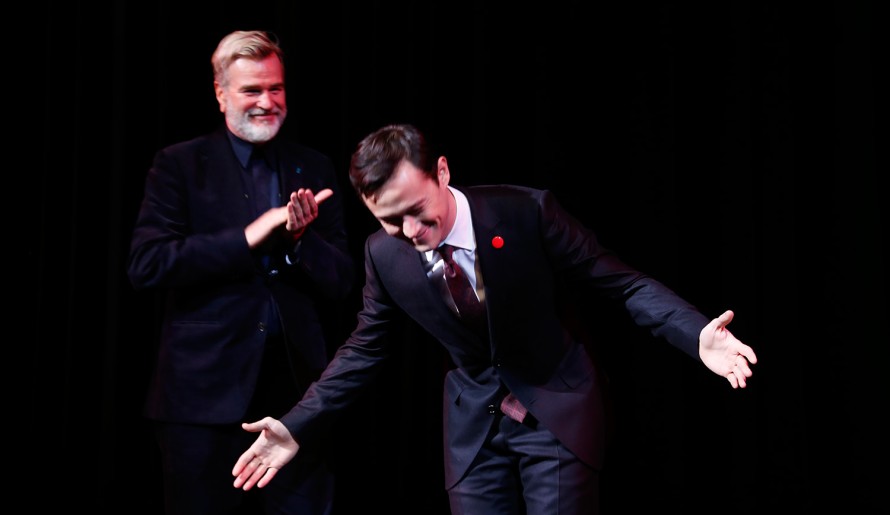
Panorama programme director Wieland Speck and Don Jon's Addiction director Joseph Gordon-Levitt onstage at Friedrichstadt-Palast
A Danish documentary film caused a sensation and won the Panorama Audience Award. The Act of Killing delves into the atrocities committed by Indonesian death squads following the military coup in 1965. Over one million supposed communists were killed within a year, and the crimes left unpunished. The film consistently penetrates its subject via the memories of the perpetrators, letting them not only tell about their deeds, but re-enact them. This approach makes the film's staging very similar to that of the magnum opus of the director to whom the 2013 Berlinale Homage was dedicated: Claude Lanzmann. Distilling the memories of witnesses out of their bodies and movements, conducting an existential analysis, and thereby getting to the heart of the unspeakable -- Lanzmann established the technique with Shoah. The French director was touched and delighted to be recognised for his work with the Honorary Golden Bear. The laudatory speech in the Berlinale Palast was spoken by an old friend who invited Shoah to the Berlinale in 1986: former Forum section head Ulrich Gregor.
With its documentary methods, The Act of Killing references the unclear boundaries between fiction and reality, wrote Christiane Peitz on February 15 in the Tagesspiegel: The film "highlights in a monstrous way that on which so many other films only exhaust themselves in the end: the incurable entanglement of fantasy and politics, imagination and crime, moral and displacement. Image and reality, they are age-old accomplices." The attempt to make these spheres and the zones of their indistiguishability bear fruit was a common theme in all programmes. Such aesthetic portrayals of daily life attempt to allow a perspective onto one's own historic, geographic and social dimension. The approach was particularly evident in the Forum, where films like Terra de ninguém (No Man's Land) by Salomé Lamas, Die 727 Tage ohne Karamo (The 727 Days Without Karamo) by Anja Salomonowitz, La plaga (The Plague) by Neus Ballús or Sto lyko (To the Wolf) by Christina Koutsospyrou and Aran Hughes steadily tackled reality with fictional storytelling.
Forum Expanded also attracted attention: on one hand, with the group exhibit "Waves vs. Particles" in the former Berlin-Wedding crematorium, and on the other with an unexpected cinematic venue -- the Liquidrom spa. At the latter, the audience could enjoy the imagery and sounds of the Quasi-Cinema by Hélio Oiticica and Neville D'Almeida from the comfort of the Liquidrom salt-water pool. Isabella Rossellini, who was honoured in 2013 with a Berlinale Camera and named the figurehead of Forum Expanded by section curator Stefanie Schulte Strathaus, presented her newest work Mammas.
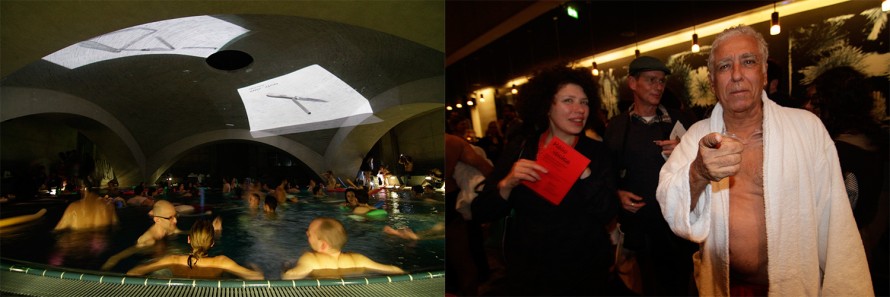
Quasi-Cinema with Neville D'Almeida (far right) at the Berlin Liquidrom
The unease that goes hand in hand with changes to political and social constants was also captured in the children's and youth film programmes of Generation. "Increased velocities" were noted by section director Maryanne Redpath and her deputy, Florian Weghorn. Typical movements in the coming-of-age, a voyage with clear departure and arrival points, were displaced by powerful and fast getaways or aimless drifting -- more radical and existential than in the years before. The big winner here was the Australian film The Rocket, taking place in the backwoods of Laos and telling a story of dangerous meanderings through poverty, superstition and the unexploded bombs of recent wars. Director Kim Mordaunt was awarded not only the Crystal Bear of the Youth Jury, but also the viewfinder for Best First Feature. The programme heads were especially happy to present two German productions as world premiers in Generation: Kopfüber (UPSIDEdown) by Bernd Sahling in Kplus and ÖDLAND - Damit keiner das so mitbemerkt (WASTELAND - So that No One Becomes Aware of It) by Anne Kodura in 14plus.
German Cinema - Today and Yesterday
In Perspektive Deutsches Kino, Anna Zohra Berrached won the FGYO-Award Dialogue en perspective for her film Zwei Mütter (Two Mothers). Using documentary techniques for her feature film, the director tells the story of a lesbian couple who encounter a number of obstacles to their desire for a child. Jan Speckenbach was happy to receive the second edition of the "Made in Germany - Perspektive Fellowship" award. In addition, the Perspektive team and its section head Linda Söffker continued the discussion series "Made in Germany - Talks on Film", with a special focus in 2013 on production conditions for new German talents within and beyond the realm of TV editing partnerships.
German film's influence on international film, at its zenith during the Weimar Republic, was the heading for the 2013 Retrospective, under the title "The Weimar Touch. The International Influence of Weimar Cinema after 1933".
Berlinale Shorts visited the topic of change as well. Programme curator Maike Mia Höhne explicitly named the organisational principles of modern societies as a guiding star of her programme. While an aesthetic category - narration - stood at the centre of the section in 2012, in 2013 it addressed open political structures. The Golden Bear for Best Short Film went to French film La Fugue (The Runaway) and its director Jean-Bernard Marlin, who sends a committed social worker into the alien-seeming banlieues of Marseilles. A German production, die ruhe bleibt (remains quiet) by Stefan Kriekhaus, received the Silver Bear.
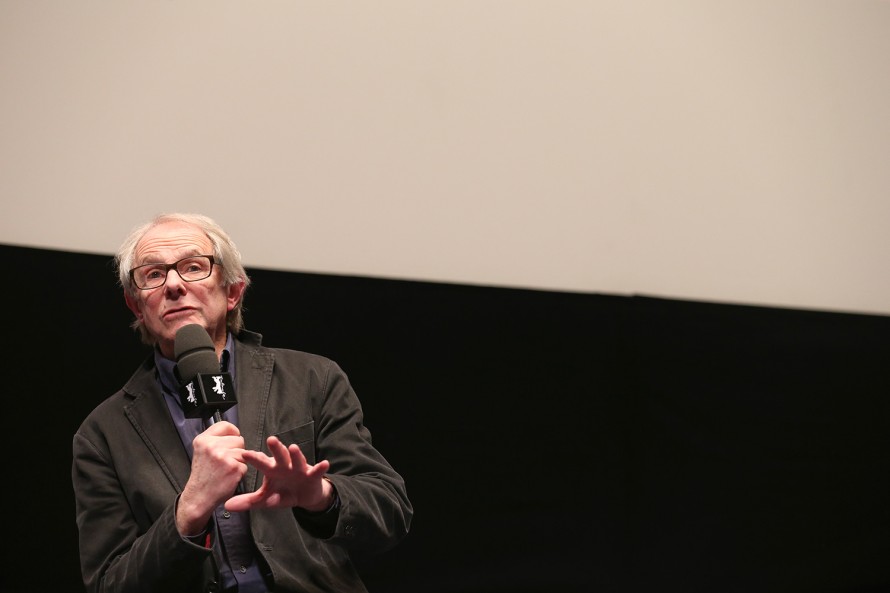
Director Ken Loach at Haus der Berliner Festspiele
Thanks to its success in 2012, the discussion series Film + Talk was continued at Haus der Berliner Festspiele as part of the 2013 Berlinale Special programme. With The Spirit of '45, Ken Loach presented yet another facet of the core topics in 2013: the loss of alternatives to capitalism. His documentary film focuses on post-WWII Britain, when socialism was a reality, and the decline of the community under the pressure of Margaret Thatcher's neo-liberal agenda since the 1980s. In Assistance Mortelle (Fatal Assistance), Port-au-Prince native and former Haitian Minister of Culture Raoul Peck questions the sense and nonsense of well-meaning relief operations for countries affected by catastrophe. The picture he paints is more catastrophic than the catastrophes themselves. The double feature Gold - Du kannst mehr als du denkst (Gold - You Can Do More than You Think) and Mein Weg nach Olympia (My Way to Olympia) made positive headlines. Both films focus on handicapped athletes and their participation in the 2012 Paralympics in London. Besides ensuring wheelchair access to the theatre, the Berlinale also provided a sign language interpreter to translate the film talk with directors Michael Hammon and Niko von Glasow for the hearing impaired. Director Niko von Glasgow, himself handicapped by thalidomide, said enthusiastically in an interview with Deutschlandradio on February 15, 2013, "Going to the cinema should be a basic human right! I think it's wonderful that the Berlinale took the initiative on that."
While critics see it as a symptom of over-complication in the festival, tickets were sold out on the first day of sales: "Berlinale Goes Kiez" enjoyed unbroken popularity in its fourth year. Greeted by Tom Tykwer, Benjamin Heisenberg, Ulrich Köhler and others acting as godparents to the programme, audiences and festival guests enjoyed screenings in the Berlinale Kiez cinemas. With "NATIVe - A Journey into Indigenous Cinema", the festival presented a new special series dedicated to global cinematographic tales of indigenous peoples. Curated by Maryanne Redpath, the 2013 series focused on the "traditional" regions of indigenous film culture: Australia, New Zealand/Oceania, Canada and the US.
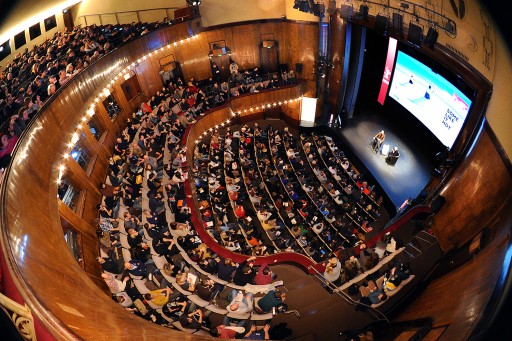
Berlinale Talent Campus 2013 at HAU1
A Good Year for the Film Industry
"Some Like it Hot - Filmmakers as Entertainers" was the motto of the 11th Berlinale Talent Campus. According to project heads Matthijs Wouter Knol and Christine Tröstrum, film is primarily a part of the entertainment industry, and that aspect is often overlooked during the project development phase. Discovering new financing models and distribution paths, as well as panels and workshops with prominent guests like Matthew Libatique, Paul Verhoeven, Jane Campion or Ulrich Seidl were part of the programme.
The Berlinale Co-Production Market celebrated its 10th anniversary in 2013. 38 selected projects searched for production partners, including five projects from the Berlinale Residency initiative, which took place for the first time in 2012. The Residency offers up-and-coming filmmakers a three-month project development stay in Berlin. The European Film Market also profited in 2013 from its position as the foremost international film trade fair of the year. As in years previous, it saw an increase in exhibitors, and sales stayed constant despite difficult economic circumstances. Particularly well-received were the Industry Debates, which included talks on perspectives in the film industry of war-ridden Europe and the future of 3D technologies.
Facts & Figures of the Berlinale 2013
| Visitors | |
|---|---|
| Total amount of theater visits | 475,822 |
| Tickets sold | 303,077 |
| Professionals | |
| Accredited guests (press excl.) | 15,934 |
| Countries of origin | 124 |
| Press | |
| Journalists | 3,695 |
| Countries of origin | 81 |
| Screenings | |
| Number of films in the public programme | 360 (incl. 108 short films) |
| Total amount of screenings | 965 |
| European Film Market | |
| Film industry participants | 8,091 |
| Number of films | 816 |
| Number of screenings | 1,166 |
| EFM-Stands (Martin-Gropius-Bau & Business Offices) |
172 |
| Number of exhibitors | 455 |
| Berlinale Co-Production Market | |
| Participants | 486 |
| Countries of origin | 43 |
| Berlinale Talent Campus | |
| Participants | 303 |
| Countries of origin | 96 |
| Annual budget | € 19.5 million |
| The Berlin International Film Festival receives € 6.5 million in institutional funding from the Federal Government Commissioner for Culture and the Media in accordance with a decision by the German Bundestag. | |